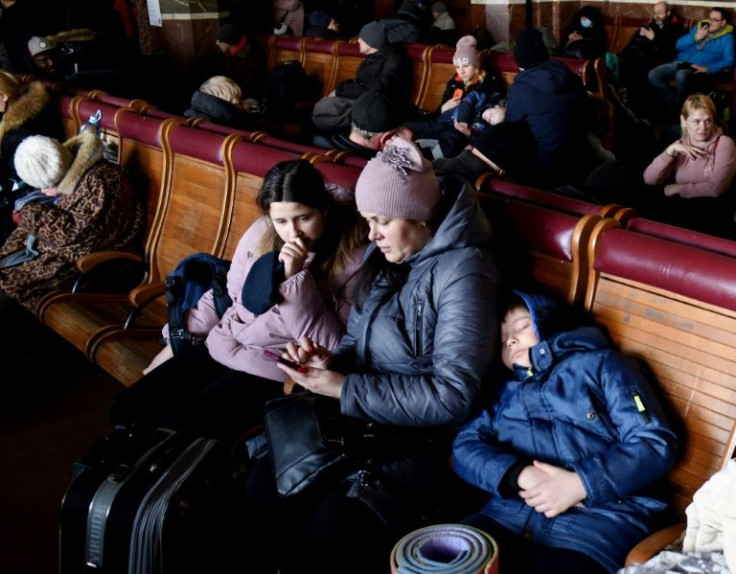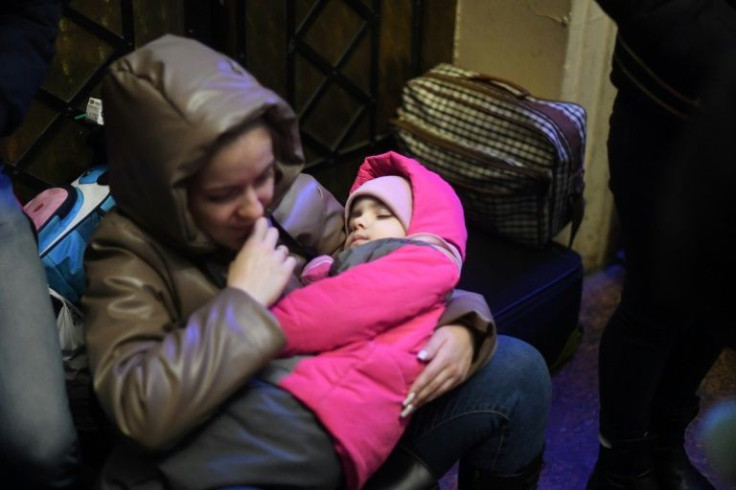Fleeing Ukrainians Go West, Seeking Refuge
At the packed train station in the western Ukrainian city of Lviv, Olga Kovalchuk joined crowds looking for a ticket to safety in a European Union country far from the Russian invasion.
She had no ticket and no real plans for the future. She was just hoping to be able to take a train to Poland where her niece was waiting to welcome her.
The librarian fled with her 10-year-old daughter from her home in the central city Zhytomyr when the firing started.
"We're leaving because we are under fire and we are supposed to hide in the shelters," she said. "I don't want to traumatise my daughter as she is scared."
Kovalchuk is among the hundreds of thousands who fled their homes after Russia invaded Ukraine on Thursday, launching air strikes, artillery bombardments and missile attacks in several parts of the country.
So far, the conflict has claimed the lives of 350 Ukrainian civilians -- 16 of them children, according to Kyiv.
More than half a million people have already fled abroad, the UN refugee agency said Monday, with neighbouring Poland alone having taken in nearly 300,000 people.
Many more are expected to follow.

Lviv is where several western embassies had already transferred their activities, moving out of Kyiv in the run-up to the war.
Now it has become a crucial staging point for Ukrainians fleeing the conflict.
Many are determined to keep heading westwards, despite traffic jams up to 30 kilometres (18 miles) long leading back from the border with Poland.
Others are settling in here, without quite knowing how long they will have to stay. But accommodation is already scarce and even basic necessities are becoming hard to find in the supermarkets.
The authorities have organised free trains to take people across Ukraine towards several EU countries. The scenes at Lviv station are chaotic and the trains are packed.
Haggard-looking travellers scan the timetables, dragging suitcases and prams from one end of the station to the other. Police and military patrols are a constant presence. Volunteers in bright yellow vests hand out free tea and biscuits.

Maryna, a 32-year-old social worker, arrived with her two children from Dnipro, further to the east. She too is hoping for passage to Poland -- and she does not think she will ever be able return home.
"We stay here all day, we have no plan," she said, identifying herself with only her first name. "There are too many people, we don't understand what's going on."
Her husband stayed behind to fight the Russians.
Faced with such extraordinary scenes, local people have not stood idle.
Ostap Lun, the owner of a ranch in the nearby village of Lopuchna, has opened the doors of its small hotel to travellers and it has been full ever since.
"Obviously, we aren't taking money for the lodgings," said Lun, a sturdy-looking 47-year-old.
"We are going to do everything to make things comfortable -- and most of all, safe -- for people who have found themselves without a home," he said.
One of his guests, Iryna Plakhuta, while grateful for the respite, struggled to hold back her tears.
"Our husbands stayed in Kyiv," said the 43-year-old executive. "They are protecting Ukraine. It's so hard."
Pregnant with her second child, she sleeps fully dressed because the air raid sirens are constantly going off, forcing everyone down into the shelters.
Back at the Lviv railway station, Kovalchuk is determined not to lose hope.
While she felt bad for what the country, particularly its children, were having to go through, she insisted she was determined not to give up.
"We hope Ukraine will win because justice is on our side," she said. "We haven't hurt anyone."
© Copyright AFP 2024. All rights reserved.





















